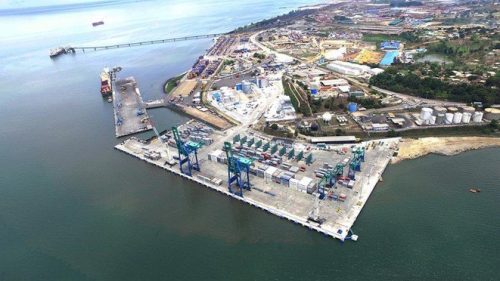
PIDG company and the Emerging Africa Infrastructure Fund (EAIF) have arranged the long-term debt finance for a €305 million new port development by Gabon Special Economic Zone Ports (GSEZ Ports) at Owendo, Gabon.
In a group statement, the firms noted that in addition to its sole mandated lead arranger role, EAIF is lending the company €40 million over 15 years, on a first ranked basis. GSEZ Ports is EAIF’s first project in Gabon. It is the largest industrial-scale infrastructure public-private partnership in the country. Financial close was achieved on 26 July.
The African Development Bank (AfDB), which led the structuring of the finance, is lending an additional €40 million. The new funds will refinance the project, releasing money for the largest shareholder to reinvest in other infrastructure projects in Africa, some in Gabon. Seventy-five per cent of the capital for the port project is shareholder equity.
GSEZ Ports has been awarded a 30-year concession to build and operate the new port.
Expanding Gabon’s port capacity at Owendo and developing the special economic zone (SEZ) are key elements in the country’s drive to diversify its economy, reduce logistics costs for Gabon businesses and expand the non-oil sectors. GSEZ is also the developer of the Gabon Special Enterprise Zone and allied facilities that have attracted 123 businesses from 18 countries.
The combination of Gabon’s diversification strategy and the SEZ is forecast to see growth rise to between 4% and 5% over the medium term. According to the World Bank, GDP in 2018 was 1.2%.
Supporting the development of SEZs is a strategic priority for PIDG.
SEZs have the benefit of reliable infrastructure and services, often attract clusters of companies in sectoral supply chains and stimulate local and foreign direct investment. SEZs help to improve employment growth and economic sustainability.
PIDG says that SEZs are ideal for a blended finance approach, where public and private capital can mobilise long term capital for investment infrastructure that meets the needs of growing businesses.
EAIF Executive Director, Emilio Cattaneo, says: “We are proud to be involved in Gabon’s drive to strengthen its industrial base, build employment and skills and create a more broadly-based economy.
“GSEZ Ports is a powerful example of public and private capital working in partnership to create a development that will benefit Gabon for decades to come.”
GSEZ Ports is a wholly-owned subsidiary of the Gabon Special Economic Zone. The shareholders include Olam International (40.5%), Gabonese Caisse des Depots et Consignations (CDC) owned by the Republic of Gabon (38.5%) and Africa Finance Corporation (21%).
Théophile Ogandaga, Deputy General Director at GSEZ, says: “The Emerging Africa Infrastructure Fund immediately saw the strategic economic development potential for Gabon of our new port. GSEZ Ports has benefitted from the expertise, experience and skill of EAIF and from the PIDG focus on special enterprise zones.
“Our state-of-the-art port has been angular and critical for Gabon’s economy during the last two years and this new funding will help us elevate it even further,” Ogandaga said.
The enlarged port was certified completed in June 2019 and had involved 1,800 construction workers, mainly from Gabon. The investment by GSEZ Ports will see the creation of an additional 380 permanent port operations jobs.
Nazmeera Moola, head of EAIF at IAM ( EAIF, managed by Investec Asset Management, IAM), says: “EAIF has been able to do business where local finance institutions are not yet in a position to meet the large scale needs of infrastructure developers. As the economy of Gabon grows and diversifies, local banks should see the success of the GZEP Ports development and evolve products and services tailored to satisfying the local need for long-term capital.”